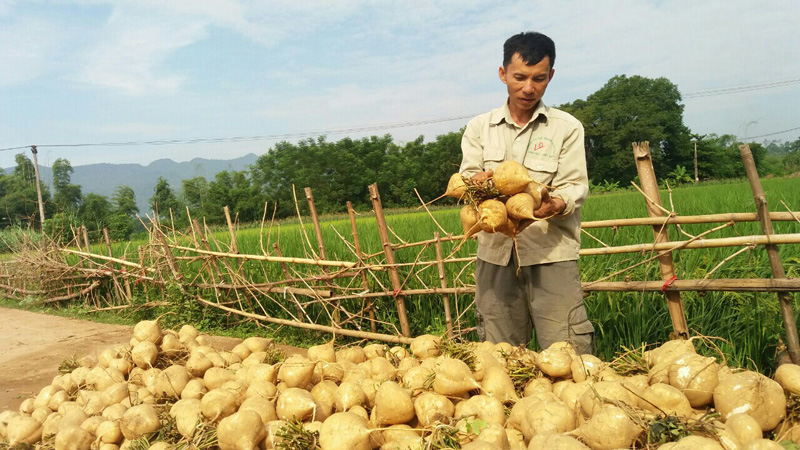
(HBO) – Tan My commune in Lac Son district, the northern mountainous province of Hoa Binh, has a total area of over 3,000 hectares, of which more than 2,700 hectares are arable land. Over the past years, under the leadership of the local Party Committee and administration, residents in the commune have actively shifted the crop and livestock structures, helping improve their living standards.

Bui Van Mung’s family in Kho hamlet, Tan My commune, Lac Son
district, has invested in growing pachyrrhizus tubers in an effort to raise income.
Over the past time, farmers in Tan My
commune have actively transferred crop and livestock structures and focused on
goods production. With abundant natural land, locals have spurred economic
development by growing sugarcanes, citrus trees, acacia trees and short-term
industrial plants like gourd, pachyrrhizus and chilli. They mostly raise
animals in farms. The commune has two large-scale breeding farms. More than 143
households in the locality have participated in service business activities.
Along with economic development,
local infrastructure has also received investment. The State has helped with cement
while local residents contributed workdays and land, as well as money to buy
sand and gravel. Thanks to such joint efforts, the whole of the 5.77-km road in
the commune has been concretized. Local schools have also been upgraded,
meeting teaching and learning demands of teachers and students at different
levels. Besides, the standard medical centre has also satisfied primary health
care demands of local people.
With the achievements, as of the end
of 2016, Tan My basically met all the 19 criteria of a new-style area. Rural
areas in the commune have been given a facelift and its economic life improved
significantly. In 2018, the commune’s average per capita income reached 31.5
million VND. The number of poor households was brought down to 9.7 percent.
Currently, the commune is focusing on maintaining and improving the quality of
new-style rural area criteria, aiming to raise material and spiritual life of
local people.
In Lac Thuy district, communes have been succeeded in promoting their One Commune-One Product (OCOP) products while others are still struggling to position their typical farming products in market. Some communes in the district still fail to have their products met OCOP programme’s requirements, while others have seen their certifications expired.
The inspectorate agency of Hoa Binh province has issued Official Dispatch No. 1090/TTr-PCTN to provincial departments, agencies, localities, business associations, enterprises, and investors regarding measures to improve informal component indexes of the Provincial Competitiveness Index (PCI).
Hoa Binh is taking concrete steps to improve its investment environment, with a strong focus on supporting businesses, settling obstacles for strategic investors, and creating opportunities for robust development in the coming years.
Under the blazing early summer sun, the construction site of Nhuan Trach Industrial Park (IP) in Luong Son district is abuzz with activities from dawn to dusk, a testament to the determination of the investor to meet their construction targets on schedule.



